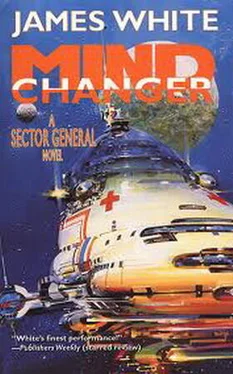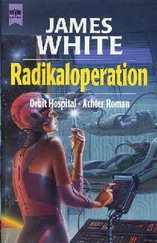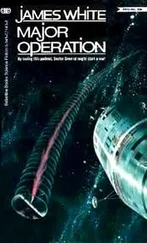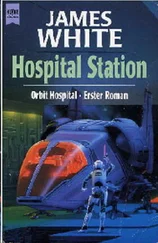James White - Mind Changer
Здесь есть возможность читать онлайн «James White - Mind Changer» весь текст электронной книги совершенно бесплатно (целиком полную версию без сокращений). В некоторых случаях можно слушать аудио, скачать через торрент в формате fb2 и присутствует краткое содержание. Год выпуска: 1998, Жанр: Фантастика и фэнтези, на английском языке. Описание произведения, (предисловие) а так же отзывы посетителей доступны на портале библиотеки ЛибКат.
- Название:Mind Changer
- Автор:
- Жанр:
- Год:1998
- ISBN:нет данных
- Рейтинг книги:5 / 5. Голосов: 1
-
Избранное:Добавить в избранное
- Отзывы:
-
Ваша оценка:
- 100
- 1
- 2
- 3
- 4
- 5
Mind Changer: краткое содержание, описание и аннотация
Предлагаем к чтению аннотацию, описание, краткое содержание или предисловие (зависит от того, что написал сам автор книги «Mind Changer»). Если вы не нашли необходимую информацию о книге — напишите в комментариях, мы постараемся отыскать её.
Publishers Weekly
Mind Changer
Star Healer
the Galactic Gourmet
Mind Changer
Mind Changer — читать онлайн бесплатно полную книгу (весь текст) целиком
Ниже представлен текст книги, разбитый по страницам. Система сохранения места последней прочитанной страницы, позволяет с удобством читать онлайн бесплатно книгу «Mind Changer», без необходимости каждый раз заново искать на чём Вы остановились. Поставьте закладку, и сможете в любой момент перейти на страницу, на которой закончили чтение.
Интервал:
Закладка:
Of course you’re not trying to shift the responsibility, O’Mara thought wryly, except to make me responsible for finding the answer. Aloud, he said, “The serious postoperative developments in this case may be blinding you to some of the factors of the original causation. Patient Tunneckis’s condition is rare, perhaps unique, and certain)ynothinglike it has occurred in recent Kerma history Why is this? What is there different about the physical circumstances or the surroundings or some other undiscovered factor of Tunneckis’s accident that did not happen, or perhaps could not have happened, in the past?
“Are you sure you have all the facts, Doctors?”
Thornnastor stopped vibrating the floor with its feet. Prilicla’s trembling diminished. Conway was frowning and looking as though he was thinking hard. But O’Mara wasn’t finished with them yet.
“As chief psychologist I’ve probably known what you have been thinking before you knew it yourselves,” he said, looking at each of them in turn, “but as your hospital administrator I’m obliged to make the position and the decisions required of you as clear and unequivocal as possible. Sector General may be faced with the greatest threat in its history, not to its structure but to its personnel and continued existence as the greatest multi-species hospital in the Federation. The duration of this threat is presently unknown and totally dependent on the life expectancy of patient Tunneckis, which is likely to be short and mentally unpleasant if it is condemned to solitary confinement inside a vast, deserted hospital with only robot devices to feed and care for it until they malfunction beyond their ability to self-repair. So we may well be absent from the hospital for only a few months or years.
“We must therefore ask ourselves” he went on, “whether the indeterminate lifetime of one patient is worth the financial and emotional cost and the physical disruption it is causing to the establishment, the staff, and the other patients, some of whom, particularly the water-breathing Chalders and ultra-low-temperature crystalline life-forms, may not survive the necessarily hasty evacuation. There is a very simple, completely sensible option if the answer to this problem isn’t found. It is the easiest answer to our problem, although ethically it is a little tricky, but all of you must have considered it or are considering it now.”
O’Mara paused for a moment, then ended grimly, “Should we assist patient Tunnekis to terminate painlessly without further waste of time?”
Prilicla’s body was shaking in the emotional gale that was sweeping the room. O’Mara looked at it apologetically, knowing that it would know exactly how he was feeling, too. But strangely, the emotional radiation was causing the empath’s quivering body gradually to grow still.
“Friend O’Mara,” it said finally, “there is nobody here or, I believe, anywhere else in the hospital, who will accept that option.”
CHAPTER 32
Patient Tunneckis was transferred from the otherwise empty recovery ward and through the silent and deserted adjoining levels to the original OR on a remotely controlled litter and immobilized on the operating table. Sensor pads were attached to its oval, sluglike body and it was prepped for the operation, all without being touched by human or any other hands. It was totally relaxed by the local anesthetic but it was and would remain fully conscious.
Watching it intently on a large lecture screen ten levels away were Diagnosticians Conway and Thornnastor, Senior Physician Prilicla, Lieutenant Braithwaite, and O’Mara himself. It was O’Mara who spoke first, and solely to the patient.
“Tunneckis.” he said with gentle reassurance, “we are trying to cure you. Even though you may think that you are telepathically deaf and dumb you are not, at least not completely. Since shortly after you arrived here you have been unknowingly transmitting a continuous, sense-free telepathic shout, a sound so loud, so intensely unpleasant and far-reaching that our medical staff and patients have had to be moved beyond its range. That is why remotely controlled devices instead of people have been taking care of you.”
Beside him he heard Conway give a quiet, incredulous grunt at his massive understatement of the situation. O’Mara ignored him and went on, “But if you can still use your telepathic faculty to shout then it is not completely lost. That is promising because it may be only a short step from being able to shout to being able to speak, and listen, normally. That is why the hospital’s two best doctors are going into your brain to try to rectify the fault. You will be fully conscious during the operation, but as the brain interior has no pain receptors you should feel no physical discomfort. You may, however, feel sensory changes while the doctors are working there. It would be helpful if you told us what they are or how they are affecting your mind. Tenneckis, do you agree to us performing this operation and will you help us during it?”
He knew that they were going to do the operation anyway, with or without the patient’s cooperation, but it would be kinder to let it think that it still had a say in the matter.
“I’m, I’m afraid” the distant Tunneckis replied. It made a low, hissing sound that did not translate, then went on, “I’m afraid of this place, and your cold, shiny, clicking machines that do things to me, and of all the horrible people in the hospital including you. Mostly I’m afraid of going on living this way. Please, I just want this black, awful, continual fear of everybody and everything to stop.”
O’Mara thought of Dr. Cerdal as he had seen it last, heavily sedated but still babbling and crying and completely out of control, and of the others, who had had less protracted contact with Tunneckis and who were in proportionately better shape. He could have said that he understood because others were feeling the same intense and unreasoning fear of all those around them that manifested itself as manic xenophobia, but that would have been adding guilt to the patient’s already crushing mental load.
Instead he said gently, “We want to cure you, Tunneckis, and remove the cause of that fear. Will you help us?”
The silence seemed to last much longer than the few seconds shown on the room’s chronometer, but finally the answer came.
“Yes.”
O’Mara gave an almost explosive sigh of relief and looked away from the screen. Braithwaite was looking quietly pleased, Thornnastor was stamping a forefoot against the floor in agitation, the emotional radiation from some person or persons in the room was giving Prilicla the shakes again, and Conway was frowning and chewing at his lower lip. O’Mara sighed again more quietly.
“Conway,” he said dryly, “I know the signs. You are thinking about doing something stupid. Well?”
“I’ve been too busy to thank you properly or bring you up to date on the later developments” said Conway quickly. “That was a really good steer you gave us about reinvestigating Tunneckis’s accident. The Orligian medical officer on Kerm base was once a forensic scientist, and it took the scene of the crime-I mean the accident-and related circumstances apart and used a microscopic sieve on the evidence. It sent us detailed analyses of the metal structure-the padding, and even the body paintwork of Tunneckis’s groundcar following the lightning strike, and of an undamaged vehicle of the same type. There were also the results of a complete physical examination on a normally healthy Kerm volunteer to serve as an organic benchmark. But it was you who pointed us in the right direction in the first place and…
“Flattery doesn’t work on me,” O’Mara broke in sharply, “so get to the point.”
Читать дальшеИнтервал:
Закладка:
Похожие книги на «Mind Changer»
Представляем Вашему вниманию похожие книги на «Mind Changer» списком для выбора. Мы отобрали схожую по названию и смыслу литературу в надежде предоставить читателям больше вариантов отыскать новые, интересные, ещё непрочитанные произведения.
Обсуждение, отзывы о книге «Mind Changer» и просто собственные мнения читателей. Оставьте ваши комментарии, напишите, что Вы думаете о произведении, его смысле или главных героях. Укажите что конкретно понравилось, а что нет, и почему Вы так считаете.












